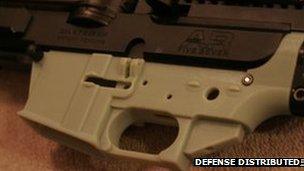MakerBot pulls 3D gun-parts blueprints after Sandy Hook
- Published

Gun control advocates say 3D-printed guns are no longer a "movie fantasy"
3D printing firm MakerBot has pulled a collection of blueprints for gun parts from its website in the wake of last week's Sandy Hook mass school shooting.
Users were notified by lawyers that the software models for parts were deleted from design-sharing site Thingiverse.
MakerBot attorney Richard McCarthy said "recent events served as the impetus to take immediate action".
The move came as US President Barack Obama set a January deadline for proposals to deal with gun violence.
There have been calls for gun law reform after 26 children and teachers died at Sandy Hook School in Newtown, Connecticut.
MakerBot cited its terms of service that users agree not to use the website "to collect, upload, transmit, display, or distribute any user content that... promotes illegal activities or contributes to the creation of weapons, illegal materials or is otherwise objectionable".
'Creative focus'
The company said that it had the right to review and take appropriate action against Thingiverse users if they breached its terms of use - the only hitch being that until a day ago, anyone could download files for key gun components, including the latest lower receiver for an AR15 semi-automatic rifle.
Mr McCarthy, who represents the company, said in a comment to tech website Cnet: "We reiterate or emphasize the site's focus on creative empowerment for products that have a positive impact."
New York-based MakerBot has a 22% market share of all 3D printers, and is better known for its printable objects of everything ranging from toys, 3D portraits, tools and even Jedi lightsabers. Each Replicator 2 Desktop 3D Printer costs about $2,200 (£1,350).
The fresh debate over gun control in the US could increase scrutiny over the 3D-printed gun market. One US congressman last week urged a renewal of the 1988 Undetectable Firearms Act which bans firearms capable of slipping through airport metal detectors. The law expires in December 2013.
The call by Congressman Steve Israel was made in reaction to a test-firing of a "Wiki Weapon" by members of a group aiming to create the world's first 3D-printed gun.
"Congress passed a law banning plastic guns for two decades, when they were just a movie fantasy," said Mr Israel.
"With the advent of 3D printers these guns are suddenly a real possibility, but the law Congress passed is set to expire next year," he added.
'Internet routes'
Reacting to MakerBot's crackdown, Cody Wilson, founder of Defense Distributed which is behind the "Wiki Weapon" project, reportedly said that he planned to create a new site for "hosting 'fugitive' 3D-printable gun files in the next few hours".
"The internet routes around censorship," he said. "The project becomes more vital."
His company website says: "This project might change the way we think about gun control and consumption. How do governments behave if they must one day operate on the assumption that any and every citizen has near instant access to a firearm through the internet?"
Making 3D printed guns a reality still has a long way to go, the first being as Defense Distributed states: "These guns will be almost completely plastic, so melting and failing in your hand will be a concern."
Victims of last Friday's massacre were being laid to rest as Mr Obama appointed Vice-President Joe Biden to lead a task force to produce concrete proposals on the reform of gun laws within a month.
- Published3 October 2012
- Published20 September 2012
- Published2 July 2012